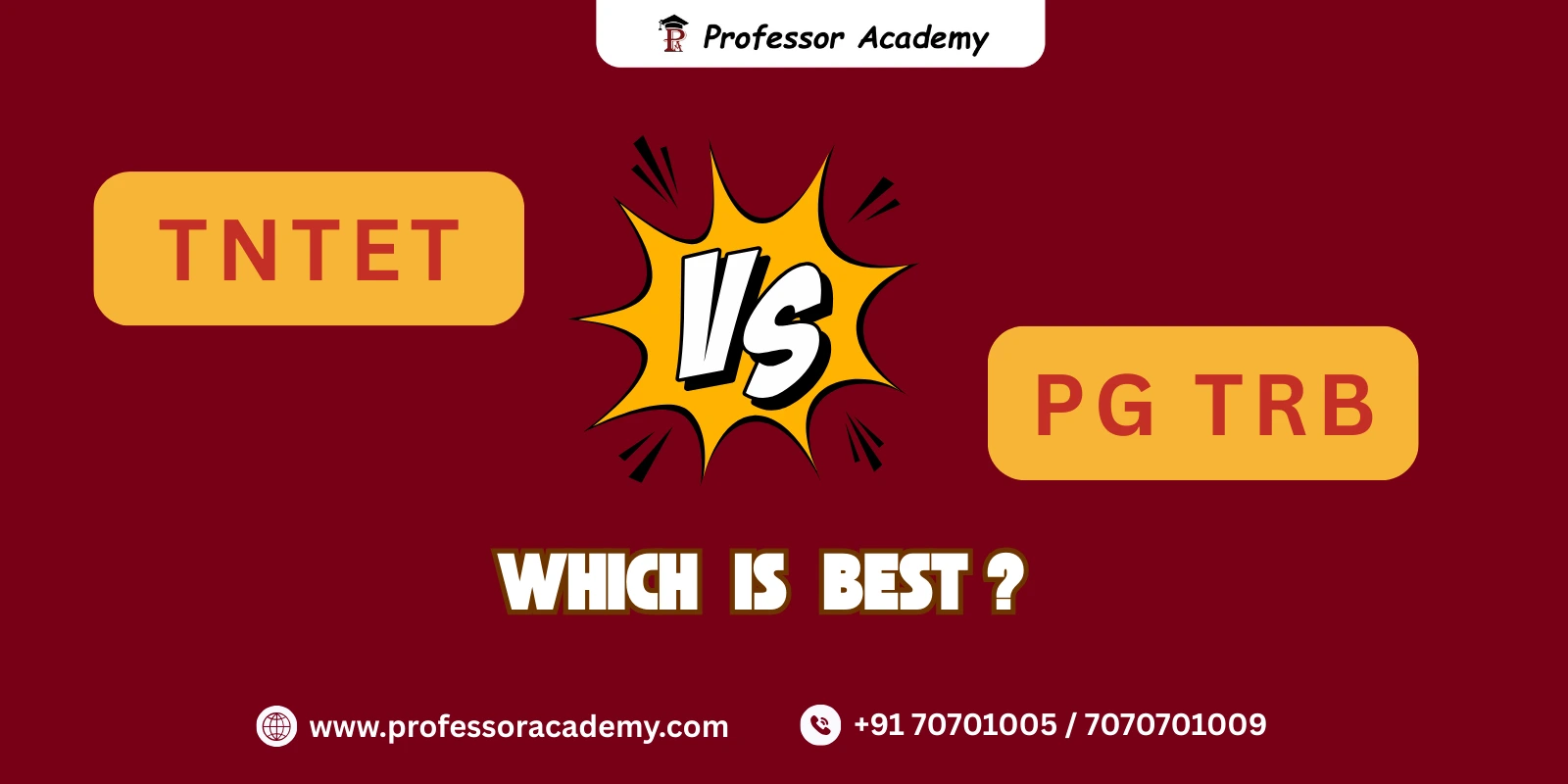
For teaching aspirants in Tamil Nadu, two major competitive exams often come into focus — TNTET (Tamil Nadu Teacher Eligibility Test) and PG TRB (Post Graduate Teacher Recruitment Board exam).
Although both are conducted by the Teachers Recruitment Board (TRB), Government of Tamil Nadu, they cater to different teaching levels, qualifications, and career paths.
Choosing between them depends on your academic background, teaching ambitions, and the level at which you want to teach.
This comprehensive guide will help you understand the differences in purpose, eligibility, syllabus, exam pattern, and career scope so you can make the right choice for your teaching career.
| Feature | TNTET | PG TRB |
| Full Form | Tamil Nadu Teacher Eligibility Test | Post Graduate Teacher Recruitment Board Exam |
| Conducting Body | Teachers Recruitment Board (TRB), Tamil Nadu | Teachers Recruitment Board (TRB), Tamil Nadu |
| Purpose | Qualifying exam for teaching Classes I–VIII in government & aided schools | Direct recruitment exam for Post Graduate Assistants in Higher Secondary Schools |
| Level of Teaching | Primary & Upper Primary School | Higher Secondary School (Class XI & XII) |
| Minimum Qualification | D.El.Ed. / B.El.Ed. / B.Ed. depending on paper | Postgraduate degree in relevant subject + B.Ed. |
| Mode of Exam | Offline (OMR-based) | Offline (OMR-based) |
| Certificate Validity | Lifetime | Recruitment-based (one-time exam) |
TNTET is a mandatory eligibility test for candidates who wish to become school teachers for Classes I–VIII in Tamil Nadu. It ensures that aspiring teachers meet the standards set under the Right to Education (RTE) Act.
The TNTET is a qualifying test, meaning that passing it does not directly secure a teaching position. However, it is a mandatory eligibility requirement for applying to Teachers Recruitment Board (TRB) teaching posts, including SGT and UG TRB vacancies.
PG TRB is a direct recruitment examination for appointing Post Graduate Assistants in Higher Secondary Schools across Tamil Nadu.
These teachers handle Class XI and XII students and are subject specialists.
| Criteria | TNTET | PG TRB |
| Teaching Level | Classes I–VIII | Classes XI–XII |
| Type of Exam | Eligibility test | Recruitment test |
| Minimum Qualification | D.El.Ed. / B.El.Ed. / B.Ed. | PG Degree + B.Ed. |
| Job Guarantee | No (eligibility only) | Yes (direct recruitment based on merit) |
| Syllabus Level | School syllabus + pedagogy | Higher secondary + PG-level subject knowledge |
| Certificate Validity | Lifetime | Not applicable (exam-based selection) |
| Competition Level | Moderate to high | High – subject specialist competition |
TNTET:
PG TRB:
Choose TNTET if:
Choose PG TRB if:
At Professor Academy, we provide exclusive online coaching for both TNTET and PG TRB in English and Tamil mediums, ensuring complete alignment with TRB’s official syllabus and exam patterns.
TNTET Coaching:
PG TRB Coaching:
With 1,000+ achievers across TRB exams, our proven strategy ensures students are exam-ready.
While both TNTET and PG TRB are prestigious TRB-conducted exams, their purposes are entirely different.
TNTET serves as an eligibility milestone for aspiring school teachers, whereas PG TRB is a direct recruitment gateway for higher secondary teaching roles.
If you’re starting out in teaching and meet D.El.Ed./B.Ed. qualifications, TNTET is your entry point.
But if you already hold a postgraduate degree with B.Ed. and want to secure a specialist teaching post in higher secondary schools, PG TRB is your best choice.
Either way, Professor Academy offers the expertise, resources, and mentorship to guide you from preparation to success.
Start your journey with us today — your teaching career in Tamil Nadu begins here.
For More Information:
Contact Us At:
+91 7070701005,
+91 7070701009,
+91 8807108794,
+91 8124408794
TNTET vs PG TRB – Frequently Asked Questions (FAQs)
Q1. What is the main difference between TNTET and PG TRB?
TNTET (Tamil Nadu Teacher Eligibility Test) is an eligibility exam for teaching Classes I–VIII in schools, whereas PG TRB (Post Graduate Teacher Recruitment Board exam) is a direct recruitment exam for Post Graduate Assistants in Higher Secondary Schools.
Q2. Does clearing TNTET guarantee a teaching job?
No. Clearing TNTET only makes you eligible to apply for teacher recruitment drives. You must still qualify in TRB’s recruitment exams to secure a job.
Q3. Is PG TRB harder than TNTET?
Generally, yes. PG TRB questions are at a postgraduate level and require deeper subject expertise, while TNTET is based on school syllabus and pedagogy.
Q4. What qualifications are required for TNTET?
Paper 1: Higher Secondary + D.El.Ed. / B.El.Ed.
Paper 2: Graduation + B.Ed.
Q5. What qualifications are required for PG TRB?
A postgraduate degree in the relevant subject (minimum 50% marks) + B.Ed. degree from a recognized institution.
Q6. Which exam offers a higher salary – TNTET or PG TRB?
PG TRB positions (Post Graduate Assistants) come with a higher pay scale and allowances compared to school-level teaching jobs obtained through TNTET.
Q7. Can I write both TNTET and PG TRB?
Yes, if you meet the eligibility for both exams. Many candidates start with TNTET and later appear for PG TRB to move into higher-level teaching roles.
Q8. How often are TNTET and PG TRB conducted?
Both exams are generally conducted once a year by the Teachers Recruitment Board, Tamil Nadu.
Q9. Which exam should I choose if I want to teach higher secondary students?
You should aim for PG TRB as it is specifically for Post Graduate Assistants in Classes XI–XII.
Q10. Does Professor Academy provide coaching for both TNTET and PG TRB?
Yes. Professor Academy offers specialized online coaching for both exams in English and Tamil mediums, including live classes, recorded sessions, mock tests, and previous year paper analysis.

Hi!
